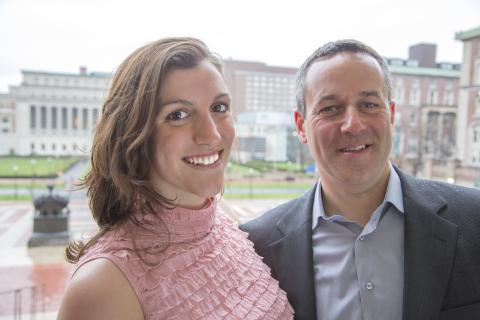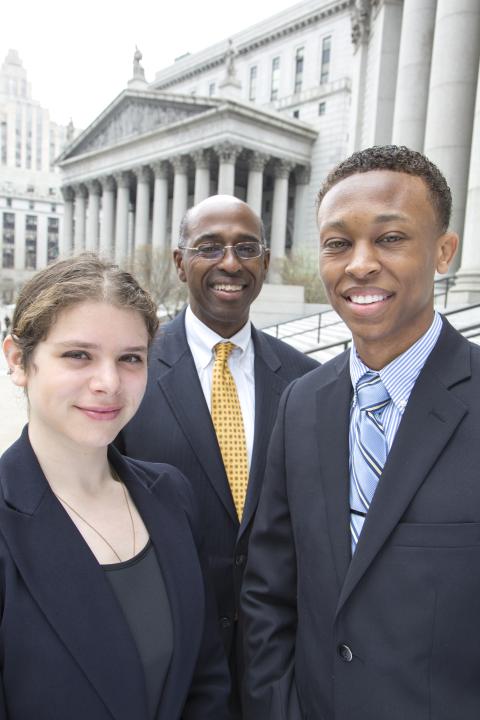When Dr. Thomas Nero Jr. ’89 was an undergraduate, the philosophy-religion major wasn’t sure what career path he would pursue. The summer between his sophomore and junior years, exploring an interest in medicine, he interned with Dr. George Hashim ’67 GSAS, a professor at the Medical School studying autoimmune disease. “It was a transformative experience, and convinced me I could go to medical school,” says Nero, now a cardiologist in private practice in Stamford, Conn.
 Michael S. Satow ’88, president and CEO of Nutrition 21, says Corinna Bertelson ’14 “made a real contribution” during her CCASSIP internship last summer. Photo: Leslie Jean-Bart ’76, ’77J
Michael S. Satow ’88, president and CEO of Nutrition 21, says Corinna Bertelson ’14 “made a real contribution” during her CCASSIP internship last summer. Photo: Leslie Jean-Bart ’76, ’77J
Never having forgotten his pivotal internship, Nero contacted the College about 1½ years ago seeking to provide a similar experience for today’s College students. The timing was perfect. He was told about a program set to debut in summer 2012: the Columbia College Alumni-Sponsored Student Internship Program (CCASSIP). Nero happily signed up to take on a student intern, and Ruth Angrand ’13, an art history major and volunteer with the Columbia University Emergency Medical Service, landed the opportunity.
As opposed to a research internship or shadowing experience, the CCASSIP internship was very hands-on, Angrand says. She helped Nero organize an event to train lay people in CPR and also worked with his patients, interviewing them, taking their vitals and sitting in during consultations and procedures.
“I had a vague inclination to be an ER doctor, and I’ve completely changed because of the internship. Now I want to be a cardiologist,” Angrand says. “Dr. Nero was such a great mentor and doctor, by the end of the summer I pretty much wanted to do what he does.”
CCASSIP is the result of a partnership between the Columbia University Center for Career Education (CCE) and the Columbia College Alumni Association (CCAA) to provide work experience and career mentoring for students. Alumni sponsors arrange for internships at their workplaces; CCE supplies the students with training and follow-up, including goal-setting workshops and tips on getting the most out of an internship. In addition, students attend social and networking events organized by CCE for all CCASSIP participants and, at the end of the summer, each submits a project, in the format of their choosing, about their experience. Some created blogs recording their work experiences; others submitted a letter, essay or photo essay.
CCE works with the Alumni Office to identify potential alumni sponsors. A committee of volunteers led by Jonathan Sobel ’88 and Kyra Tirana Barry ’87 then reaches out to prospects on an individual basis; potential sponsors also receive a letter from Dean James J. Valentini, describing the program and encouraging their participation. “This program has and will continue to build upon existing alumni engagement in student career development,” says Kavita Sharma, dean of CCE.
“I found internships to be extremely helpful in guiding my early career choices and believe that it is my job to help current students so that they too are able to make educated decisions about their career paths,” says Stacy Rotner ’99, corporate responsibility manager at the law firm Sidley Austin in New York; Rotner was an alumni sponsor both last year and this year. “CCASSIP provides invaluable opportunities for students while it helps to build and strengthen the Columbia College community.”
Last summer, 27 rising juniors and seniors participated in eight- to 12-week internships at 20 alumni’s workplaces, including AOL Ventures, NBCUniversal, Public Art Fund, Peppertree Engineering, The Kitchen and The Jed Foundation. This year the program has grown to more than 40 interns.
“It is my job to help current students so that they too are able to make educated decisions about their career paths.” — Stacy Rotner ’99
CCE recruits students to the program in part through information sessions, which cover an array of internship opportunities, late in the fall semester and in January; administrators then help them one-on-one to prepare cover letters and resumes. Accepted interns attend a half-day training session and are taught workplace etiquette and how to handle scenarios that might arise: What if you come into work early and there’s nothing to do? How do you handle water cooler gossip? When is an appropriate time to connect to a coworker on LinkedIn? How do you dress? Special emphasis is placed on getting the most out of the work relationships — getting to know the employer and expanding one’s network.
To that end, each intern also is paired with an alumni mentor. The mentors, who don’t work at the same company as the intern and might not even be in the same field, are recruited and matched by CCE based on several factors including career interests, shared majors or shared class activities while on campus. (Mentor recommendations also come from CCAA and Columbia College Young Alumni.) The mentors serve as additional contacts to answer questions and discuss concerns about working in the real world and life beyond college.
By design, CCASSIP students do substantive work. Samantha Peltz ’14 and Christopher Perkins ’14 were placed in the Newark, N.J., office of the Hon. Joseph A. Greenaway Jr. ’78, U.S. Court of Appeals Judge for the Third Circuit, who also is a University Trustee and adjunct faculty member. Their main project was to help Greenaway prepare a speech to be given at Columbia in celebration of Constitution Day (September 17), which celebrates the signing of the U.S. Constitution. “I feel I’ve read about every civil rights case in the history of the country,” Peltz says of the research effort. “It was one of my favorite experiences and opportunities I’ve had through Columbia.”
Greenaway respects the interns’ abilities and wants to ensure that both he and the interns get the most out of the relationship. “What I’ve learned is, they have much more to contribute than you might think,” he says. “The real point of this is: Can Columbia kids get an opportunity to do something they wouldn’t otherwise be able to do? The question is never, ‘Are they capable?’ but are you going to be able to give them enough to do so they feel they’re making a worthwhile contribution?”
Michael S. Satow ’88 arranged for Corinna Bertelsen ’14 to work at Nutrition 21, a supplement company in Purchase, N.Y., of which he is president and CEO. Among other things, she prepared databases using information from human clinical studies and crafted PowerPoint presentations to be used for R&D and marketing purposes. Because of the company’s small size, Bertelsen also was able to interact with the executives. For example, she joined in on a conference call with a media consulting firm and the head of sales and marketing regarding Nutrition 21’s approach to social media, and subsequently created and ran the company’s Twitter feed.
 The Hon. Joseph A. Greenaway Jr. ’78 (center) stayed in touch with CCASSIP interns Samantha Peltz ’14 and Christopher Perkins ’14 even after the program ended. Photo: Leslie Jean-Bart ’76, ’77J
“It was great having her. She made a real contribution — it’s good for business as well as good for the student,” Satow says. “I think if people knew the quality of the candidates they could give offers to, they’d realize they’d be lucky to have the opportunity to work with them because they’re so impressive.” He says a bonus was hearing how campus life today is both different and the same as when he was in school.
The Hon. Joseph A. Greenaway Jr. ’78 (center) stayed in touch with CCASSIP interns Samantha Peltz ’14 and Christopher Perkins ’14 even after the program ended. Photo: Leslie Jean-Bart ’76, ’77J
“It was great having her. She made a real contribution — it’s good for business as well as good for the student,” Satow says. “I think if people knew the quality of the candidates they could give offers to, they’d realize they’d be lucky to have the opportunity to work with them because they’re so impressive.” He says a bonus was hearing how campus life today is both different and the same as when he was in school.
The internship was Bertelsen’s first experience working in an office. She says she learned how tough it is to handle a 9–5 job, with a commute, and find time to keep up consistent training (Bertelsen is a member of the varsity swim team). She says she also realized the advantages of working for a small company, as well as her affinity for the field: “This program was illuminating in discovering what I want to do. I might like to pursue something in pharmaceuticals.” She noted that many of the company’s leaders have advanced degrees, which has inspired her to think about getting a master’s or Ph.D.
A successful internship program draws on the talents of both parties: Students are expected to work hard, and alumni sponsors must do their part to make sure the experience is meaningful. “It’s not easy, it’s not like you can get a free employee — that’s not the point,” Nero says. “I spent at least an hour a day with them I’d otherwise spend on work. The aim is to get them excited about the field.” Angrand says she had many discussions with the doctor, not only about patients and procedures but also about women in medicine, the business of having a private practice “and of course Obamacare.”
Greenaway, too, made sure to mentor the interns closely. In addition to making himself available for daily discussion time, he arranged for guests from other fields of law. “It gave me specificity about what options I might have after law school,” Peltz says. “Judge Greenaway takes mentoring very seriously. How accessible he was was amazing, especially for how busy he is.”
Greenaway says that CCASSIP is a great example of [another] way that alumni can give back to the College that doesn’t involve writing a check. “No matter what the professional endeavor, there are opportunities for Columbia students to have challenging and interesting experiences, and it’s as or more rewarding for the alum as for the student,” he says. In January, he met with Peltz and Perkins about possibly turning his Constitution Day speech into a book and how they might help with that.
Nero believes so strongly in the internship program that he has been trying to convince fellow alumni to participate, including his wife, Elizabeth Zimels ’89, a veterinarian. “The more we get involved with the College as alumni, the better the College will be,” Nero says. “We should stay involved. Our college experience should never end.”
— Shira Boss ’93, ’97J, ’98 SIPA. A version of this article originally appeared in the Summer 2013 issue of Columbia College Today.